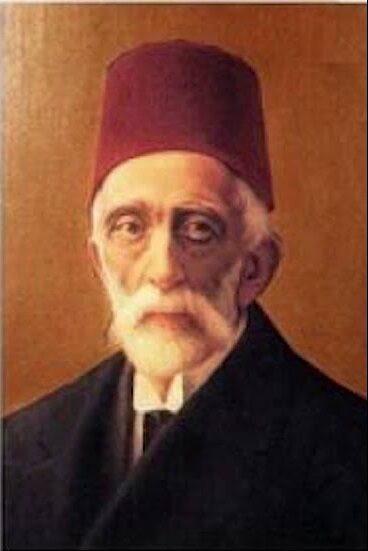Death of Garabed Melkonian (July 23, 1934)

Garabed Melkonian had only completed elementary school, but had an acute sense of the importance of education and science in the development of a nation. He put his fortune to good use for the benefit of the Armenian people.
Melkonian was born in 1849 in Talas (Caesarea, now Kayseri). Like his elder brother Krikor (1843–1920), he received his primary education at the Gumushian School of Caesarea, then they went into commerce. The brothers emigrated to Romania after the Russo–Turkish war of 1877-1878 and settled in Focsani. Shortly thereafter, they moved to Egypt and sold tobacco at a rented store. After a few years, they went from tobacco sales to production, opening the first factory of the K. and G. Melkonian company in 1882 in Zagazig, which was later moved to Alexandria. They opened their second factory in Fayum (1888) and a new one built in Cairo (1900) concentrated the activities of the enterprises of Alexandria and Fayum. Its production of cigars reached 10 million units per month by 1914.
Krikor oversaw local operations and Garabed supervised the purchase of raw materials and the general production. The company had representatives in almost all towns of Egypt and Sudan and maintained close relations with different European and Far Eastern countries.
After the death of Krikor in 1920, Garabed offered his and his brother’s entire properties to the Republic of Armenia and received the title of First Foreign Armenian Citizen of Free Armenia. However, after the establishment of the Soviet regime, on July 25, 1921, Melkonian signed a document of donation, by which their fortune was bequeathed to the Armenian Patriarchate of Constantinople for the maintenance of three Armenian co-ed schools in Turkey and Cilicia, then under French mandate.
However, the political developments in Turkey forced Melkonian to lift the restrictions placed on location on January 5, 1924. Cyprus was chosen as the site for an orphanage, and a magnificent building was built in Nicosia. However, uncertainty about the future of Armenian institutions in Turkey compelled former Patriarch Zaven Der Yeghiayan, who represented the Patriarchate, to transfer the donation to the Armenian General Benevolent Union (AGBU) by a document signed on December 15, 1926, following negotiations between Melkonian and AGBU president Boghos Nubar.
The orphanage opened in Cyprus in 1924 changed its profile and became the Melkonian Educational Institute in 1926 under the supervision of the AGBU. It became the only Armenian boarding daily school in the Diaspora going all the way to high school. Several generations of Armenian students received a complete education there for eighty years, until the AGBU decided to close the school in 2006.
In 1927, following the wishes of Garabed Melkonian, Boghos Nubar sold the tobacco factory of Cairo to the Eastern Company. The interests of the principal deposited in the Midland Bank of London and the National City Bank of New York were destined to works of Armenian charity, according to the wishes of the benefactors.
In 1925, the AGBU allocated 3,000 Egyptian pounds from the brothers’ donation to the foundation and maintenance of the chairs of Armenian literature and history at Yerevan State University. The AGBU Melkonian Fund was created in 1930 and published 30 works of fundamental importance in Armenian studies, including Hrachia Adjarian’s seven-volume etymological dictionary, Manuk Abeghian’s Review of the Armenian Language, Levon Melikset-Bek’s two-volume The Georgian Sources on Armenia and the Armenians, etc. Between 1933 and 1937, the Melkonian Fund paid for more than fifty per cent of the expenses for the construction of the Public Library (now the National Library of Armenia) and printing house. The activities of the Fund were prohibited in Armenia in December 1937 amid the Stalinist purges.
Garabed Melkonian had passed away on July 23, 1934. The Benefactors’ Mausoleum, with the busts of Krikor and Garabed Melkonian, preserved the remains of both brothers between the twin buildings of the Melkonian Educational Institute, today closed and abandoned.
